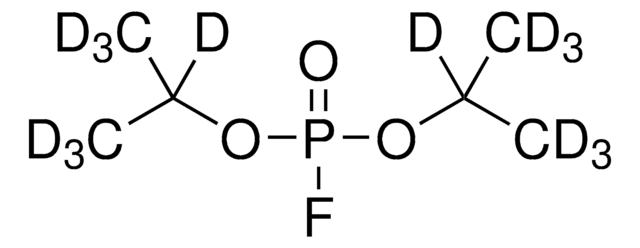Recommended Products
biological source
fermentation/recombinant
Quality Level
form
lyophilized solid
specific activity
≥30 U/mg
storage temp.
−20°C
Packaging
Bottomless glass bottle. Contents are inside inserted fused cone.
Unit Definition
One unit corresponds to the amount of enzyme which hydrolyzes 1 μmol diisopropyl fluorophosphate per minute at pH 8.1 and 22 °C
Signal Word
Danger
Hazard Statements
Precautionary Statements
Hazard Classifications
Resp. Sens. 1
Storage Class Code
11 - Combustible Solids
WGK
WGK 1
Flash Point(F)
Not applicable
Flash Point(C)
Not applicable
Personal Protective Equipment
dust mask type N95 (US), Eyeshields, Gloves
Certificates of Analysis (COA)
Search for Certificates of Analysis (COA) by entering the products Lot/Batch Number. Lot and Batch Numbers can be found on a product’s label following the words ‘Lot’ or ‘Batch’.
Already Own This Product?
Find documentation for the products that you have recently purchased in the Document Library.
Marc-Michael Blum et al.
Acta crystallographica. Section F, Structural biology and crystallization communications, 63(Pt 1), 42-45 (2006-12-22)
The enzyme diisopropyl fluorophosphatase (DFPase) from Loligo vulgaris is capable of decontaminating a wide variety of toxic organophosphorus nerve agents. DFPase is structurally related to a number of enzymes, such as the medically important paraoxonase (PON). In order to investigate
Marc-Michael Blum et al.
Journal of the American Chemical Society, 128(39), 12750-12757 (2006-09-28)
A wide range of organophosphorus nerve agents, including Soman, Sarin, and Tabun is efficiently hydrolyzed by the phosphotriesterase enzyme diisopropyl fluorophosphatase (DFPase) from Loligo vulgaris. To date, the lack of available inhibitors of DFPase has limited studies on its mechanism.
Paul D Adams et al.
Acta crystallographica. Section D, Biological crystallography, 65(Pt 6), 567-573 (2009-05-26)
X-ray and neutron crystallographic techniques provide complementary information on the structure and function of biological macromolecules. X-ray and neutron (XN) crystallographic data have been combined in a joint structure-refinement procedure that has been developed using recent advances in modern computational
T Wille et al.
Toxicology in vitro : an international journal published in association with BIBRA, 24(3), 1026-1031 (2009-12-08)
Developing improved medical countermeasures against chemical warfare agents (nerve agents) is urgently needed but time-consuming and costly. Here we introduce a robot-assisted liquid handling system with warming, cooling and incubating facilities to screen the detoxifying properties of biological and chemical
Dragomir I Draganov
Chemico-biological interactions, 187(1-3), 370-372 (2010-02-04)
Serum paraoxonase (PON1) is well recognized for its ability to hydrolyze arylesters, toxic oxon metabolites of organophosphate insecticides and nerve agents. PON1 is a member of gene family including also PON2 and PON3; however, the later two enzymes have very
Our team of scientists has experience in all areas of research including Life Science, Material Science, Chemical Synthesis, Chromatography, Analytical and many others.
Contact Technical Service









